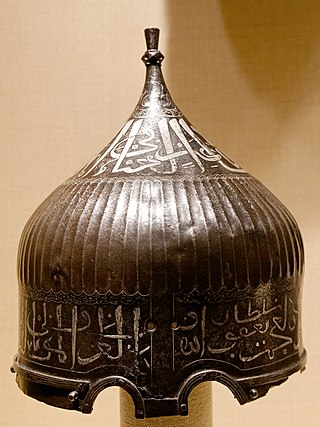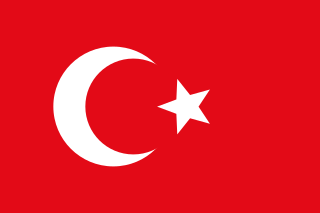Related Research Articles

Bayezid II was the eldest son and the successor of Mehmed II and ruled as Sultan of the Ottoman Empire from 1481 to 1512. During his reign, Bayezid consolidated the Ottoman Empire, thwarted a Safavid rebellion and finally abdicated his throne to his son, Selim I. Bayezid evacuated Sephardi Jews from Spain after the proclamation of the Alhambra Decree and resettled them throughout Ottoman lands, especially in Salonica.

The Eyalet of Egypt operated as an administrative division of the Ottoman Empire from 1517 to 1867. It originated as a result of the conquest of Mamluk Egypt by the Ottomans in 1517, following the Ottoman–Mamluk War (1516–17) and the absorption of Syria into the Empire in 1516. The Ottomans administered Egypt as an eyalet of their Empire from 1517 until 1867, with an interruption during the French occupation of 1798 to 1801.

"Öküz" Mehmed Pasha, also known as Kara Mehmed Pasha or "Kul Kıran" Mehmed Pasha, was an Ottoman statesman, administrator and military figure of the early 17th century who held the office of Grand Vizier twice, the first time from 17 October 1614 to 17 November 1616 and the second time from 18 January 1619 to 23 December 1619. He was also governor of Egypt from 1607 to 1611. Okuz Mehmed's nickname "Kul Kiran" (slavebreaker) came from his success in crushing the mutiny in Egypt during the early 1600s.

Lala Mustafa Pasha, also known by the additional epithet Kara, was an Ottoman Bosnian general and Grand Vizier from the Sanjak of Bosnia.

Damat was an official Ottoman title describing men that entered the imperial House of Osman by means of marriage, literally becoming the bridegroom to the Ottoman sultan and the dynasty. In almost all cases, this occurred when a man married an Ottoman princess.
Davud Pasha, also known with the epithet "Koca", was an Ottoman Albanian general and grand vizier of the Ottoman Empire from 1482 to 1497 during the reign of Bayezid II. He became a damat ("bridegroom") to the Ottoman dynasty by marrying an Ottoman princess.

Yunus Pasha was an Ottoman statesman. He was Grand Vizier of the Ottoman Empire for eight months in 1517, serving from January 30 until his death on September 13.

Hadım (Eunuch) Suleiman Pasha was an Ottoman statesman and military commander. He served as the viceroy of Ottoman Egypt in 1525–1535 and 1537–1538, and as Grand Vizier of the Ottoman Empire between 1541 and 1544. He was a Hungarian eunuch, his epithet hadım meaning "eunuch" in Turkish.
Semiz Ali Pasha was an Ottoman statesman from the Sanjak of Bosnia who served as Grand Vizier of the Ottoman Empire from 1561 to 1565. He was the beylerbey (governor) of Egypt Eyalet from 1549 to 1553. Semiz Ali Pasha was born in Prača in Bosnia, and replaced Rüstem Pasha as a Grand Vizier. After palace schooling, he discharged high-level functions along the Ottoman Empire. His epithet "Semiz" means "fat" in Turkish.
Mere Hüseyin Pasha was an Ottoman statesman of Albanian origin. He was two times Grand Vizier of the Ottoman Empire in 1622 and 1623, and previously the Ottoman governor of Egypt between 1620 and 1622. His epithet "Mere!" comes from the word for "Take it!" in Albanian; he was nicknamed so because of the many times he ordered his men to "take [the heads]" of his opponents, i.e. execute them. He was purportedly the only grand vizier who did not speak Ottoman Turkish or Osmanlica.

Sanjak of Bosnia was one of the sanjaks of the Ottoman Empire established in 1463 when the lands conquered from the Bosnian Kingdom were transformed into a sanjak and Isa-Beg Isaković was appointed its first sanjakbey. In the period between 1463 and 1580 it was part of the Rumelia Eyalet. After the Bosnia Eyalet was established in 1580 the Bosnian Sanjak became its central province. Between 1864 and the Austro-Hungarian occupation of Bosnia in 1878 it was part of the Bosnia Vilayet that succeeded the Eyalet of Bosnia following administrative reforms in 1864 known as the "Vilayet Law". Although Bosnia Vilayet was officially still part of the Ottoman Empire until 1908 the Bosnian Sanjak ceased to exist in 1878.

Safranbolulu Izzet Mehmet Pasha was a grand vizier of the Ottoman Empire and served from 1794 to 1798.
Hümaşah Sultan was the Eighth Haseki and only legal wife of Sultan Ibrahim of the Ottoman Empire.
Halime Sultan was a consort of Sultan Mehmed III, and the mother of Sultan Mustafa I. The first woman to be Valide Sultan twice and the only to be Valide twice of a same son. She had at least four children with Mehmed: two sons Şehzade Mahmud and Mustafa I, and two daughters Hatice Sultan and Şah Sultan. She was de facto co-ruler as Valide Sultan from 22 November 1617 to 26 February 1618 and from 19 May 1622 to 10 September 1623, because her son was mentally instable. Halime was also one of the prominent figures during the era known as the Sultanate of Women.
Ibrahim Pasha was an Ottoman statesman who served shortly as the governor of Egypt in 1604 before he was murdered by mutinying sepahi soldiers of the Ottoman Army. He also served as defterdar of the Ottoman Empire four times.
Davud Pasha or Davut Pasha or Dawud Pasha may refer to:
Hadım Ali Pasha was an Ottoman statesman who served as the Ottoman governor of Diyarbekir Eyalet, Bosnia Eyalet, and Egypt Eyalet.
Seyyid Abdullah Pasha was an Ottoman statesman who served as grand vizier from 1747 to 1750. He also served as the Ottoman governor of Cyprus, Rakka (1746), Konya (1750), Bosnia (1750–51), Egypt (1751–52), Diyarbekir (1752–60), and Aleppo (1760).
Divitdar Mehmed Emin Pasha was an Ottoman statesman who served as grand vizier of the Ottoman Empire from 1750 to 1752. After this, he was exiled to Rethymno on Crete for three years.
References
- 1 2 Giancarlo Casale (26 January 2010). The Ottoman Age of Exploration. Oxford University Press. pp. 87, 102. ISBN 978-0-19-979879-7.
- 1 2 Süreyya, Bey Mehmet, Nuri Akbayar, and Seyit Ali. Kahraman. Sicill-i Osmanî. Beşiktaş, İstanbul: Kültür Bakanlığı Ile Türkiye Ekonomik Ve Toplumsal Tarih Vakfı'nın Ortak Yayınıdır, 1890. Print.